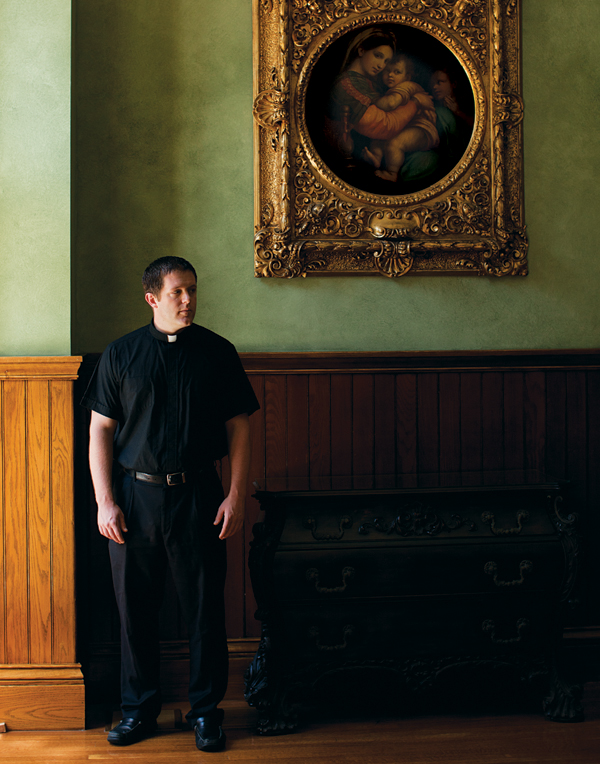Becoming a Priest at an Unpopular Time
 Eric Cadin decided to become a priest at the height of the Catholic Church’s sex-abuse scandal. (Photo by Matt Kalinowski)
Eric Cadin decided to become a priest at the height of the Catholic Church’s sex-abuse scandal. (Photo by Matt Kalinowski)
When I first started reporting for my story “Resurrection,” I was hoping to understand what seemed like a straightforward question: Who wants to become a priest in 2012?
After all, a man who decides to become a priest is choosing a profession at a time when its public reputation has never been lower. Fifty years ago, Catholic priests were pillars of the community: trusted, holy men of integrity. Today, they’re widely seen as a group of odd, lonely, and sexually-repressed men who abuse children at an alarmingly high rate. In 2002, a Wall-Street Journal-NBC News poll showed that 64 percent of people thought priests “frequently” abuse children. Clearly, that’s a number inflated by anger over the abuse scandal, but still, various studies and reports have shown that somewhere between 4 percent and 10 percent of American priests between 1950 and 2003 were accused of sexually assaulting children. The Catholic Church has taken many measures to stop the abuse, including instituting stricter screenings and immediately reporting allegations to the police, but the fact remains that most people still don’t trust priests like they used to.
The Church is well aware of its public-relations problem. As Father Chris O’Connor, the vice-rector at St. John’s Seminary, is fond of saying: “Priests are like airplanes. Most of them take off and land, take off and land, and everything’s fine. You only hear about the ones who crash.”
The past decade has seen a lot of terrible crashes, and in the six months while I was reporting the story, there were a few bad ones. In July, Monsignor William Lynn of the Archdiocese of Philadelphia was sentenced to three to six years of prison time for allowing abuse to occur. And locally, Father Andrzej J. Urbaniak, a priest in South Boston, was arrested in August for possessing child pornography. The crashes, unfortunately, will probably continue.
While all the men I spoke to were outraged and upset about the sexual-abuse scandal—not that it was exposed, but that it happened—most of their concerns weren’t about their reputation, but about their lives. After all, the priesthood is an abundantly difficult road to travel. If you stay true to the path, you’re giving up the ability to be married, to have sex, to have biological children, to change your career path, to pick where you want to live, to make a lot of money, and to have a lot of possessions. You know, just about everything that modern America values.
The family part seemed to be the biggest stumbling block for many of the men. When one seminary student told his family at dinner that he wanted to become a priest, his mother stopped eating and sighed. “You just graduated college, you have your whole life ahead of you!” she told him. “I thought you’d start dating, get married, have kids.” His brother later expressed more pointed concerns: “You can’t get married! You’ll never have sex!”
It’s something the student thought about a lot. “I’m not going to have a family,” he told me. “Some nights, I will go home to a rectory, and all the lights will be off and I will be alone. Can I do that?” He ultimately believed it was right for him: “Every man is called to marriage, whether it’s a natural one to a woman or a supernatural one to the Church,” he said. “I’ve learned that I might be alone, but I’m not lonely.”
To choose to become a priest in 2012 requires an overwhelming abundance of faith in God and the Church. This student and others I met, including the story’s subject, Father Eric Cadin, vehemently believed that God was calling them to serve. Whether priests do, on the balance, more good than harm is a religious and moral question for individuals to decide, but I will say this: I sincerely hope they land safely. Not because it’s good for the Church, but because Boston doesn’t need any more crashes.


